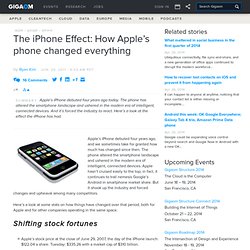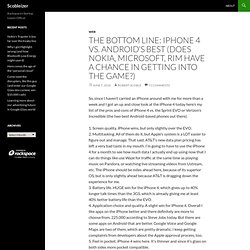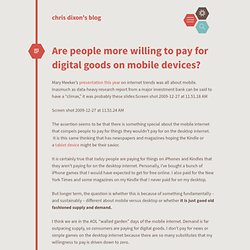

The iPhone Effect: how Apple’s phone changed everything. Apple’s iPhone debuted four years ago, and we sometimes take for granted how much has changed since then.

The phone altered the smartphone landscape and ushered in the modern era of intelligent, connected devices. Apple hasn’t cruised easily to the top; in fact, it continues to trail nemesis Google’s Android in smartphone market share. But it shook up the industry and forced changes and upheaval among many competitors. Here’s a look at some stats on how things have changed over that period, both for Apple and for other companies operating in the same space. Shifting stock fortunes Apple’s stock price at the close of June 29, 2007, the day of the iPhone launch: $122.04 a share. Worldwide smartphone market share shifts since 2007 Second quarter 2007: Symbian 65.6 percent, Windows Mobile 11.5 percent, RIM 8.9 percent, according to Gartner.First quarter 2011: Android 36 percent, Symbian 27.4 percent, iOS 16.8 percent, RIM 12.9 percent. Apple revenues shift toward the iPhone App ecosystems thrive. The bottom line: iPhone 4 vs. Android’s best (does Nokia, Micros.
So, since I haven’t carried an iPhone around with me for more than a week and I got an up and close look at the iPhone 4 today here’s my list of the pros and cons of iPhone 4 vs. the Sprint EVO or Verizon’s Incredible (the two best Android-based phones out there). 1.

Screen quality. iPhone wins, but only slightly over the EVO. 2. Multitasking. All of them do it, but Apple’s system is a LOT easier to figure out and manage. That said, AT&T’s new data plan pricing has left a very bad taste in my mouth. So, will I start using an iPhone again? To the second part of this question. Well, let’s look at the strength’s of each company. 1. Anyway, Apple is still on top of the mind share mountain and that’s a powerful place, indeed, to be. What do you think?
Android. Are people more willing to pay for digital goods on mobile devic. Mary Meeker’s presentation this year on internet trends was all about mobile.

Inasmuch as data-heavy research report from a major investment bank can be said to have a “climax,” it was probably these slides: The assertion seems to be that there is something special about the mobile internet that compels people to pay for things they wouldn’t pay for on the desktop internet. It is this same thinking that has newspapers and magazines hoping the Kindle or a tablet device might be their savior. It is certainly true that today people are paying for things on iPhones and Kindles that they aren’t paying for on the desktop internet.
Personally, I’ve bought a bunch of iPhone games that I would have expected to get for free online. But longer term, the question is whether this is because of something fundamentally – and sustainably – different about mobile versus desktop or whether it is just good old fashioned supply and demand. I think this habit argument is greatly overplayed.